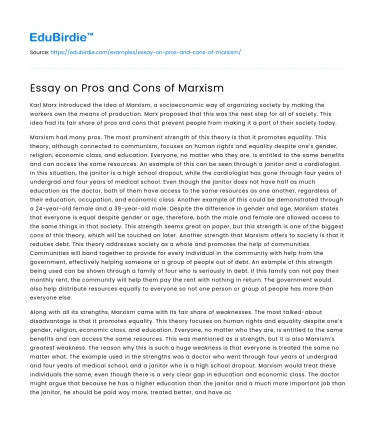Karl Marx introduced the idea of Marxism, a socioeconomic way of organizing society by making the workers own the means of production. Marx proposed that this was the next step for all of society. This idea had its fair share of pros and cons that prevent people from making it a part of their society today.
Marxism had many pros. The most prominent strength of this theory is that it promotes equality. This theory, although connected to communism, focuses on human rights and equality despite one’s gender, religion, economic class, and education. Everyone, no matter who they are, is entitled to the same benefits and can access the same resources. An example of this can be seen through a janitor and a cardiologist. In this situation, the janitor is a high school dropout, while the cardiologist has gone through four years of undergrad and four years of medical school. Even though the janitor does not have half as much education as the doctor, both of them have access to the same resources as one another, regardless of their education, occupation, and economic class. Another example of this could be demonstrated through a 24-year-old female and a 39-year-old male. Despite the difference in gender and age, Marxism states that everyone is equal despite gender or age, therefore, both the male and female are allowed access to the same things in that society. This strength seems great on paper, but this strength is one of the biggest cons of this theory, which will be touched on later. Another strength that Marxism offers to society is that it reduces debt. This theory addresses society as a whole and promotes the help of communities. Communities will band together to provide for every individual in the community with help from the government, effectively helping someone or a group of people out of debt. An example of this strength being used can be shown through a family of four who is seriously in debt. If this family can not pay their monthly rent, the community will help them pay the rent with nothing in return. The government would also help distribute resources equally to everyone so not one person or group of people has more than everyone else.
Save your time!
We can take care of your essay
- Proper editing and formatting
- Free revision, title page, and bibliography
- Flexible prices and money-back guarantee
Along with all its strengths, Marxism came with its fair share of weaknesses. The most talked-about disadvantage is that it promotes equality. This theory focuses on human rights and equality despite one’s gender, religion, economic class, and education. Everyone, no matter who they are, is entitled to the same benefits and can access the same resources. This was mentioned as a strength, but it is also Marxism’s greatest weakness. The reason why this is such a huge weakness is that everyone is treated the same no matter what. The example used in the strengths was a doctor who went through four years of undergrad and four years of medical school, and a janitor who is a high school dropout. Marxism would treat these individuals the same, even though there is a very clear gap in education and economic class. The doctor might argue that because he has a higher education than the janitor and a much more important job than the janitor, he should be paid way more, treated better, and have access to better and more resources than the janitor. The doctor may argue that he is superior to the janitor in many ways, therefore he should be giving extra attention. This con is the number one reason why Marxism and communism will never work in a democratic government, the only way to make these theories work is by having an authoritarian government that goes against theirs. Another prominent disadvantage is that Marxism and communism are essentially the same things. Both promote the equality of all human beings despite one’s gender, religion, economic class, and education. This form of equality will lead to many economic struggles and will lead to rebellions. Communism will also lead to an unmotivated society, because if everyone is getting the same salary, resources, and treatment, why should anyone put any effort into their work? An example of this could be a teacher and a lawyer. Why would any of these individuals put any effort into their work, and is there going to be treated the same despite the huge difference in occupation? This weakness is one of them, if not, the reason why this theory will never work in society as it depends on the goodwill of the citizens, it depends on natural law.
Even though Marx's theory has its pros, its cons make it impractical in my opinion. The reason for this is that Marxism overly relies on natural law and the good nature of humans. Marxism can be seen as the dependent variable in this theory as it depends too much on other variables such as natural law, the independent variable. This dependence gives individuals opportunities to poke holes in this theory, and if it were to ever be applied to a society, it may lead to riots as demonstrated in the Chinese Communist Revolution where many communist sympathizers and anti-communist activists clashed, leaving areas in China in rubles. That riot should be a clear example of why communism may never work as it tries to force a 'perfect' and 'ideal' society on the citizens in society.






 Stuck on your essay?
Stuck on your essay?

